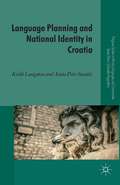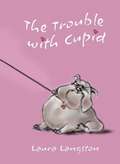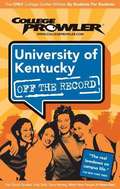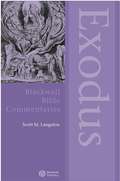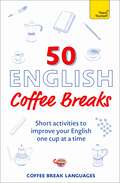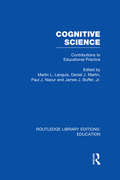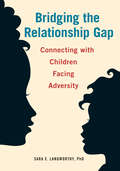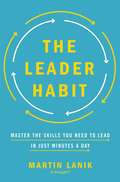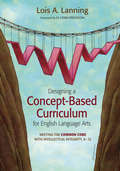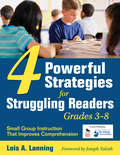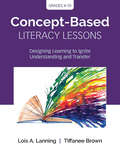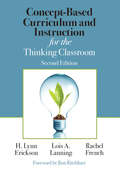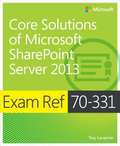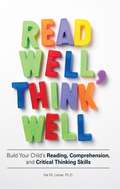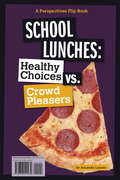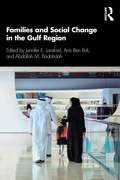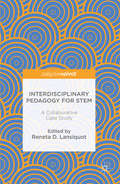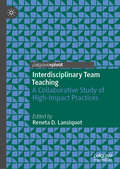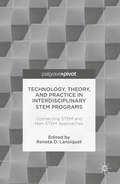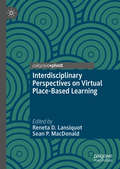- Table View
- List View
Language Planning and National Identity in Croatia (Palgrave Studies in Minority Languages and Communities)
by K. Langston A. Peti-StanticFollowing the collapse of the former Yugoslavia, Croatian was declared to be a separate language, distinct from Serbian, and linguistic issues became highly politicized. This book examines the changing status and norms of the Croatian language and its relationship to Croatian national identity, focusing on the period after Croatian independence.
The Trouble with Cupid
by Laura LangstonWhen a dog food company announces a competition to find a talented dog for their ad campaign, experienced dog trainer Erin agrees to work with the school entry: a lazy, gluttonous bulldog named Cupid.
University of Kentucky (College Prowler)
by Mandy LangstonNo university affiliations. No half-truths. No out-of-touch authors who haven't been in school for decades. A class project turned company, College Prowler produces guidebooks that are written by actual college students and cover the things students really want to know. Unlike other guides that jam everything into a five-pound book and devote only two pages to each college, our single-school guidebooks give students only the schools they want and all the information they need. From academics and diversity to nightlife and sports, we let the students tell it how it is. In addition to editorial reviews and grades for 20 different topics, more than 80 percent of each guide is composed of actual student reviews of their school. Whether readers are looking for "Best and Worst" lists, "Did You Knows?" or traditions, College Prowler guides have it all. Our books are the only place for local slang, urban legends, and tips on the best places to find a date, study, or grab a bite to eat.
Exodus Through the Centuries (Wiley Blackwell Bible Commentaries #5)
by Scott M. LangstonThis bible commentary looks at how Exodus has influenced and has been influenced by history, religion, politics, the arts and other forms of culture over the ages. A bible commentary tracing the reception history of Exodus from Old Testament times, through the Patristic and Reformation periods, to the present day. Considers the ways in which Exodus has influenced and has been influenced by history, religion, politics, the arts and other forms of culture in Jewish, Christian and secular settings. Looks at how Exodus has served as a tool of liberation and tyranny in a variety of settings. Shows how Exodus has been used to shape the identities of individuals and groups. Discusses the works of current and past poets, musicians, film-makers, authors and artists influenced by Exodus. Addresses uses of Exodus related to American and European history such as the Glorious Revolution, colonialism, the American Revolution, Civil War, Civil Rights Movement, African-Americans, and Native Americans, as well as uses by prominent and little-known historical figures Considers the impact of the Ten Commandments and other laws, in legal, political and religious contexts. The Blackwell Bible Commentary series is supported by a website at www.bbibcomm.net
50 English Coffee Breaks: Short activities to improve your English one cup at a time (50 Coffee Breaks Series)
by Coffee Break LanguagesTransform your down time into 'do time'.The most successful language learners create a habit of studying a little bit, often. With 50 English Coffee Breaks, you can easily improve your English by combining it with your relaxing daily coffee - from a 5-minute espresso to a 15-minute latte.Organised by 5, 10 and 15 minutes, these 50 varied and lively activities - from anagrams and idiom challenges to recipes and quotations - are created for high-beginner to intermediate adult and young-adult learners. The activities are carefully designed to keep you motivated and build your skills in key areas.· Reading comprehension· Writing skills· Grammar confidence· Phrasal verbs practice · Vocabulary development· Cultural awarenessBy practising English in a fun and relaxed way - in the time you have - you will find time to achieve your language-learning goals. So, pick up your preferred drink and this practical book. Soon, studying English will be the most pleasant and productive part of your busy day.For 15 years Coffee Break Languages has helped millions of people to learn a language in a way that fits into their everyday life: while walking the dog, working out at the gym, or on their coffee break!Teach Yourself has collaborated with Coffee Break Languages to bring their brilliant method to a wider audience by producing their first-ever printed product. All the activities are written by long-time English teachers in Coffee Break's characteristically friendly and conversational style. It's the perfect complement to your studies.The activities are levelled for high-beginner to low-intermediate learners: CEFR A2-B1 and ACTFL Intermediate-low/mid
50 English Coffee Breaks: Short activities to improve your English one cup at a time (50 Coffee Breaks Series)
by Coffee Break LanguagesTransform your down time into 'do time'.The most successful language learners create a habit of studying a little bit, often. With 50 English Coffee Breaks, you can easily improve your English by combining it with your relaxing daily coffee - from a 5-minute espresso to a 15-minute latte.Organised by 5, 10 and 15 minutes, these 50 varied and lively activities - from anagrams and idiom challenges to recipes and quotations - are created for high-beginner to intermediate adult and young-adult learners. The activities are carefully designed to keep you motivated and build your skills in key areas.· Reading comprehension· Writing skills· Grammar confidence· Phrasal verbs practice · Vocabulary development· Cultural awarenessBy practising English in a fun and relaxed way - in the time you have - you will find time to achieve your language-learning goals. So, pick up your preferred drink and this practical book. Soon, studying English will be the most pleasant and productive part of your busy day.For 15 years Coffee Break Languages has helped millions of people to learn a language in a way that fits into their everyday life: while walking the dog, working out at the gym, or on their coffee break!Teach Yourself has collaborated with Coffee Break Languages to bring their brilliant method to a wider audience by producing their first-ever printed product. All the activities are written by long-time English teachers in Coffee Break's characteristically friendly and conversational style. It's the perfect complement to your studies.The activities are levelled for high-beginner to low-intermediate learners: CEFR A2-B1 and ACTFL Intermediate-low/mid
Cognitive Science: Contributions to Educational Practice (Routledge Library Editions: Education)
by Marlin L. Languis Daniel J. Martin Paul J. Naour James J. Buffer Jr.This volume brings together theory, research and development in cognitive neuro-science. It investigates the neural processes involved in cognition and learning, using developments in computer technology to study the brain in action and other topographic brain mapping. Electrical activity patterns of the brain in the learning processes are displayed through these techniques. Part 1 delineates neuroscience application to educational perspectives. Part 2 reports on emotional and learning disorders, such as autism, while Part 3 applies cognitive science to educational and mental health, as well as to settings such as the classroom, rehabilitation centre or doctor’s office.
Bridging the Relationship Gap
by Sara E. LangworthyRelationships play an important role in human development, especially in the first years of life. Bridging the Relationship Gap provides caregivers tools and encouragement to be the strong, positive, and nurturing adult these children need in order to thrive.Learn more about the factors that contribute to the achievement and relationship gap, including ecological, biological, and cultural differences. Most importantly, find many tools and resources to help you more effectively deal with the tough situations and become each child's strongest ally.Sara Langworthy, PhD, currently serves as policy coordinator for Extension Children, Youth, and Family Consortium at the University of Minnesota.
The Leader Habit: Master the Skills You Need to Lead--in Just Minutes a Day
by Martin LanikIn leadership as in life, only practice makes perfect. Habits are powerful. They can lock us into negative behaviors (like snacking and smoking) or train us to act automatically in ways that benefit us (such as putting on a seat belt). Routines quietly undergird large portions of what we do and how we function. Habit formation can speed success in the workplace as well—even in complex areas like leadership. The Leader Habit spotlights 22 essential leadership abilities, breaking them down into a series of small, learnable behaviors. The accompanying 5-minute exercises help you practice each of these new skills until they stick. Drawn from a study of hundreds of leaders across the globe, the book’s simple formula focuses on developing one skill at a time: sell the vision, delegate well, innovate often, empower others, overcome resistance, build strategic relationships, focus on customers, listen actively, negotiate effectively, and more. Many of us aspire to great leadership . . . consuming books and training. But unless you intentionally reinforce the right behaviors, results are fleeting. This eye-opening and original book builds the “muscle memory” to turn leadership skills into lasting habits.
Designing a Concept-Based Curriculum for English Language Arts: Meeting the Common Core With Intellectual Integrity, K–12
by Lois A. LanningHow to ensure your ELA teaching sticks How can you teach for understanding and meet Common Core standards at the same time? The answer: with a concept-based curriculum. Fusing Lynn Erickson's groundbreaking curriculum model with implementation guidelines and sample units, this book puts you on the fast track to using concept-based curriculum in your school or district. Lanning shows you how to design a curriculum that: Functions as a framework for lesson plans Unites the efforts of ELA teachers district-wide Addresses core standards while focusing on student understanding Creates a ripple effect helping to align curriculum, assessments, and instruction
Four Powerful Strategies for Struggling Readers, Grades 3-8: Small Group Instruction That Improves Comprehension
by Lois A. LanningHelp struggling readers succeed by teaching four research-based comprehension strategies with sample lessons and a gradual-release approach leading to student-directed learning.
Concept-Based Literacy Lessons: Designing Learning to Ignite Understanding and Transfer, Grades 4-10 (Corwin Teaching Essentials)
by Lois A. Lanning Tiffanee BrownLiteracy is not a decontextualized drill of skills or learning just about "a book." You will highlight, ponder, and tab as you read about the design of Concept-Based literacy lessons. All students deserve the best literacy instruction—and this IS the BEST. —H. Lynn Erickson The guide for designing and implementing Concept-Based literacy lessons A Concept-Based Curriculum is designed to help students uncover important, transferable understandings about what it means to be a capable reader, writer, speaker, viewer, listener, and thinker. But, too often, a well-designed, conceptual curriculum does not translate into conceptual teaching. Concept Based Literacy Lessons helps bridge that divide, and provides practical support for teachers implementing Concept-Based literacy lessons. This essential guide picks up where the book, Designing Concept-Based Curriculum for English Language Arts left off. Authors Lois Lanning and Tiffanee Brown explain how to move from design to actionable practice by providing tools and examples straight from the classroom. They’ll also show teachers how to use common literacy instructional practices (such as Socratic Seminar, close reading, think aloud, explicit instruction, and so forth) to support students′ transfer of conceptual understanding. Written especially for literacy teachers, readers will find Step-by-step help with lesson planning for conceptual understanding and transfer Ideas for supporting inductive learning Classroom Snapshots that showcase familiar literacy practices in Concept-Based classrooms Strategies to promote critical, reflective, and conceptual thinking Model elementary and secondary Concept-Based lesson and unit plans A chapter devoted to answering frequently asked questions For educators looking for practical ways to implement a Curriculum and Instruction Model that’s more inquiry-driven and idea-centered, look no further than this book.
Concept-Based Literacy Lessons: Designing Learning to Ignite Understanding and Transfer, Grades 4-10 (Corwin Teaching Essentials)
by Lois A. Lanning Tiffanee BrownLiteracy is not a decontextualized drill of skills or learning just about "a book." You will highlight, ponder, and tab as you read about the design of Concept-Based literacy lessons. All students deserve the best literacy instruction—and this IS the BEST. —H. Lynn Erickson The guide for designing and implementing Concept-Based literacy lessons A Concept-Based Curriculum is designed to help students uncover important, transferable understandings about what it means to be a capable reader, writer, speaker, viewer, listener, and thinker. But, too often, a well-designed, conceptual curriculum does not translate into conceptual teaching. Concept Based Literacy Lessons helps bridge that divide, and provides practical support for teachers implementing Concept-Based literacy lessons. This essential guide picks up where the book, Designing Concept-Based Curriculum for English Language Arts left off. Authors Lois Lanning and Tiffanee Brown explain how to move from design to actionable practice by providing tools and examples straight from the classroom. They’ll also show teachers how to use common literacy instructional practices (such as Socratic Seminar, close reading, think aloud, explicit instruction, and so forth) to support students′ transfer of conceptual understanding. Written especially for literacy teachers, readers will find Step-by-step help with lesson planning for conceptual understanding and transfer Ideas for supporting inductive learning Classroom Snapshots that showcase familiar literacy practices in Concept-Based classrooms Strategies to promote critical, reflective, and conceptual thinking Model elementary and secondary Concept-Based lesson and unit plans A chapter devoted to answering frequently asked questions For educators looking for practical ways to implement a Curriculum and Instruction Model that’s more inquiry-driven and idea-centered, look no further than this book.
Concept-Based Curriculum and Instruction for the Thinking Classroom: A Multimedia Kit For Professional Development (Corwin Teaching Essentials)
by Lois A. Lanning H. Lynn Erickson Rachel FrenchDevelop students’ critical thinking, abstract reasoning, and creative learning skills with concept-based teaching! Take learning beyond the facts with a teaching approach that develops conceptual thinking and problem-solving skills. A Concept-Based curriculum recaptures students’ innate curiosity about the world and provides the thrilling feeling of using one’s mind well. Concept-Based teachers will learn how to: Meet the demands of rigorous academic standards Use the Structure of Knowledge and Process when designing disciplinary units Engage students in inquiry through inductive teaching Identify conceptual lenses and craft quality generalizations
Concept-Based Curriculum and Instruction for the Thinking Classroom: A Multimedia Kit For Professional Development (Corwin Teaching Essentials)
by Lois A. Lanning H. Lynn Erickson Rachel FrenchDevelop students’ critical thinking, abstract reasoning, and creative learning skills with concept-based teaching! Take learning beyond the facts with a teaching approach that develops conceptual thinking and problem-solving skills. A Concept-Based curriculum recaptures students’ innate curiosity about the world and provides the thrilling feeling of using one’s mind well. Concept-Based teachers will learn how to: Meet the demands of rigorous academic standards Use the Structure of Knowledge and Process when designing disciplinary units Engage students in inquiry through inductive teaching Identify conceptual lenses and craft quality generalizations
Exam Ref 70-331: Core Solutions of Microsoft SharePoint Server 2013
by Troy LanphierPrepare for Exam 70-331--and help demonstrate your real-world mastery of Microsoft SharePoint Server 2013 core solutions. Designed for experienced IT professionals ready to advance their status, Exam Ref focuses on the critical-thinking and decision-making acumen needed for success at the MCSE level. Focus on the expertise measured by these objectives: Design a SharePoint Topology Plan Security Install and Configure SharePoint Farms Create and Configure Web Applications and Site Collections Maintain a Core SharePoint Environment This Microsoft Exam Ref: Organizes its coverage by exam objectives. Features strategic, what-if scenarios to challenge you. Includes a 15% exam discount from Microsoft. Offer expires 12/31/2017.
Read Well, Think Well
by Hal W LanseMillions of children struggle with reading-and even more struggle to understand exactly what they're reading. Read Well, Think Well will help you to teach your children to build the essential reading and comprehension skills they need to succeed in today's demanding school system. Teacher trainer and literacy specialist Hal W. Lanse, Ph.D., provides the necessary knowledge, strategies, and exercises that will turn your kids into first-rate readers and thinkers. Learn how to:Choose the best, age-appropriate reading materialBoost your child's memory and retention skills through verbal and visual exercisesUtilize technology aids to help your child understand the comprehension processUnderstand the "Big Six" of reading comprehension through analysis and summary of the textPromote values for everyday life through readingRead Well, Think Well-the ultimate guide to secure your child's academic success.Hal W. Lanse, Ph.D., is a premiere teacher trainer in New York City, specializing in middle-grade and young-adult literacy. He is the winner of the 1997 Frank W. Dilley Award, Walden University's annual prize for outstanding doctoral dissertation. Dr. Lanse, a consultant with the UFT Teacher Center, trains teachers in current literacy research and shows them how to turn the research into daily classroom practice. He has also taught many parent workshops for the United Federation of Teachers. Lanse lives with his teenage son, Kenny, in New York, NY.
Read Well, Think Well: Build Your Child's Reading, Comprehension, and Critical Thinking Skills
by Hal W LanseMillions of children struggle with reading-and even more struggle to understand exactly what they're reading. Read Well, Think Well will help you to teach your children to build the essential reading and comprehension skills they need to succeed in today's demanding school system. Teacher trainer and literacy specialist Hal W. Lanse, Ph.D., provides the necessary knowledge, strategies, and exercises that will turn your kids into first-rate readers and thinkers. Learn how to:Choose the best, age-appropriate reading materialBoost your child's memory and retention skills through verbal and visual exercisesUtilize technology aids to help your child understand the comprehension processUnderstand the "Big Six" of reading comprehension through analysis and summary of the textPromote values for everyday life through readingRead Well, Think Well-the ultimate guide to secure your child's academic success.Hal W. Lanse, Ph.D., is a premiere teacher trainer in New York City, specializing in middle-grade and young-adult literacy. He is the winner of the 1997 Frank W. Dilley Award, Walden University's annual prize for outstanding doctoral dissertation. Dr. Lanse, a consultant with the UFT Teacher Center, trains teachers in current literacy research and shows them how to turn the research into daily classroom practice. He has also taught many parent workshops for the United Federation of Teachers. Lanse lives with his teenage son, Kenny, in New York, NY.
Read Well, Think Well
by Hal W. LanseMillions of children struggle with reading-and even more struggle to understand exactlywhatthey're reading. Read Well, Think Wellwill help you to teach your children to build the essential reading and comprehension skills they need to succeed in today's demanding school system. Teacher trainer and literacy specialist Hal W. Lanse, Ph. D. , provides the necessary knowledge, strategies, and exercises that will turn your kids into first-rate readers and thinkers. Learn how to: Choose the best, age-appropriate reading material Boost your child's memory and retention skills through verbal and visual exercises Utilize technology aids to help your child understand the comprehension process Understand the "Big Six" of reading comprehension through analysis and summary of the text Promote values for everyday life through reading Read Well, Think Well-the ultimate guide to secure your child's academic success. Hal W. Lanse, Ph. D. , is a premiere teacher trainer in New York City, specializing in middle-grade and young-adult literacy. He is the winner of the 1997 Frank W. Dilley Award, Walden University's annual prize for outstanding doctoral dissertation. Dr. Lanse, a consultant with the UFT Teacher Center, trains teachers in current literacy research and shows them how to turn the research into daily classroom practice. He has also taught many parent workshops for the United Federation of Teachers. Lanse lives with his teenage son, Kenny, in New York, NY.
School Lunches: Healthy Choices vs. Crowd Pleasers (Perspectives Flip Books: Issues)
by Amanda LanserChildhood obesity is a worsening problem across the country. Will mandating that schools serve healthier lunches help control the problem? Or should children and their parents have the right to choose and learn to make their own healthy choices? Perspectives Flip Books are like two books in one: Start from one end and learn why some people argue schools should ban junk food and serve healthier lunches. Then flip it over and discover why others argue students should make their own choices. Critical thinking questions help you analyze both perspectives and form your own opinions about the issue.
Families and Social Change in the Gulf Region
by Jennifer E. Lansford Anis Ben Brik Abdallah M. BadahdahThis timely volume explores the impact of dramatic social change that has disrupted established patterns of family life and human development in the countries of the Gulf Cooperation Council. It addresses several major deficits in knowledge regarding family issues in the Gulf countries, bringing a critical perspective to the emerging challenges facing families in this region. Lansford, Ben Brik, and Badahdah examine the role of urbanization, educational progress, emigration, globalization, and changes in the status of women on social change, as well as tackling issues related to marriage, fertility and parenthood, and family well-being. This book explores how family relationships and social policies can promote physical health, psychological well-being, social relationships, safety, cognitive development, and economic security in the Gulf countries, placing a unique emphasis on contemporary families in this region. Families and Social Change in the Gulf Region is essential reading for scholars from psychology, sociology, education, law, and public policy. It will also be of interest to graduate students in these disciplines.
Interdisciplinary Pedagogy for STEM
by Reneta D. LansiquotThis book focuses on constructivist theory and collaborative interdisciplinary studies, showing how constructivist theory complements interdisciplinary studies. Constructivist theory stresses how learners construct new ideas and concepts, while the interdisciplinary method requires that learners approach complex problems from multiple perspectives. The author uses the New York City College of Technology as a model to demonstrate how learning can be embedded in complex, realistic, and relevant environments. As a result, students learn to consider significant issues from a variety of viewpoints and thus negotiate their social landscape. In approaching problems that they recognize as meaningful, they take ownership of their learning and become increasingly self-aware. This scholarly book makes a theoretical contribution to its field while also offering a practical, real world example of how to successfully integrate a curriculum.
Interdisciplinary Team Teaching: A Collaborative Study of High-Impact Practices
by Reneta D. LansiquotThis book explores the community of practice at New York City College of Technology engaged in interdisciplinary team teaching. Professors report on their high-impact practices when they combine the assets of different disciplines. Chapters feature examples of the innovative curriculum resulting from a true interdisciplinary system, including place-based learning. The book also discusses questions of validity and measuring the influence of high-impact practice within interdisciplinary co-teaching.
Technology, Theory, and Practice in Interdisciplinary STEM Programs
by Reneta D. LansiquotThis book highlights models for promoting interdisciplinary thinking and an appreciation for interdisciplinary understanding among students in STEM-related fields. Studentsmajoring in science, technology, engineering, and mathematics often perceivethat courses in their major are not related to the general education liberalarts courses required for their degrees. This separation prevents the transfer of skills between their generaleducation courses and their degree pursuits. The false dichotomy is particularlyimportant because solving the daunting challenges of the twenty-firstcentury--such as drug-resistant bacteria, scarcity of natural resources, andclimate change--requires global citizens armed with robust, complex abilitieswho can integrate interdisciplinary concepts with bold technologies. Contributors to this book explore ways in which this dichotomy can be overcome.
Interdisciplinary Perspectives on Virtual Place-Based Learning
by Reneta D. Lansiquot Sean P. MacDonaldThis book explores how virtual place-based learning and research has been interpreted and incorporated into learning environments both within and across disciplinary perspectives. Contributing authors highlight the ways in which they have employed a variety of methodologies to engage students in the virtual exploration of place. In the process, they focus on the approaches they have used to bring the real world closer through virtual exploration. Chapters examine how the resources of the urban environment have been tapped to design student research projects within the context of an interdisciplinary course. In this way, authors highlight how virtual place-based learning has employed the tools of mapping and data visualization, information literacy, game design, digital storytelling, and the creation of non-fiction VR documentaries. This book makes a valuable contribution to the literature, offering a model of how the study of place can be employed in creative ways to enhance interdisciplinary learning.
